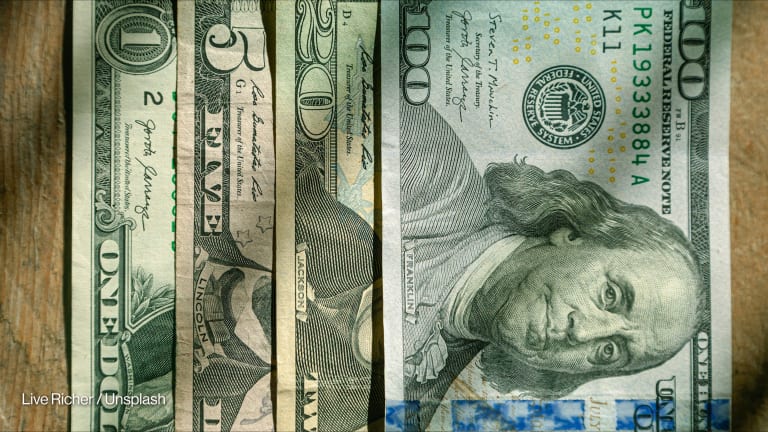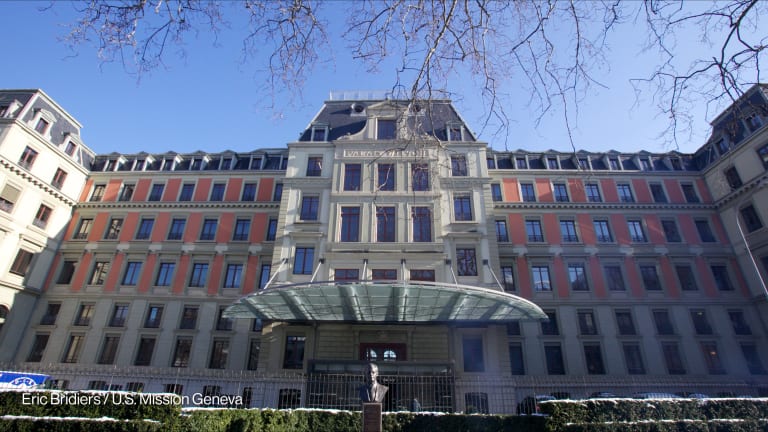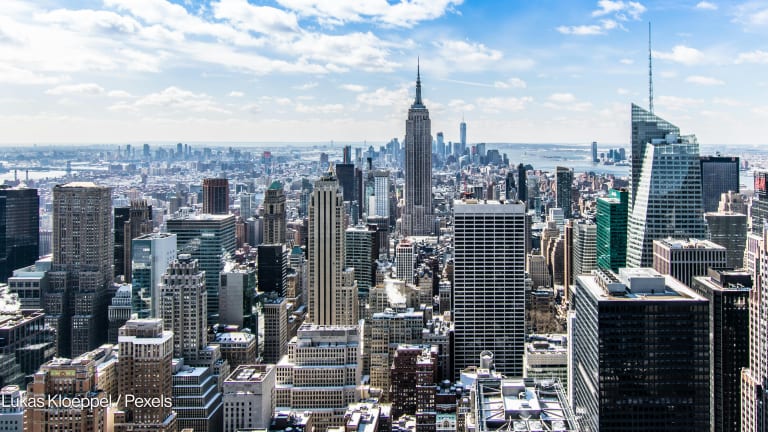Top gender equality groups and global networks: A primer
While there are hundreds of international organizations working to achieve gender equality, some groups and networks are particularly dedicated advocates. Here are some of the most prominent.
In 1995, world leaders adopted the Beijing Declaration and Platform for Action, which promises to protect and promote the rights of women and girls everywhere. Twenty years later, full gender equality has yet to be achieved in a single country — a U.N. secretary-general report reviewing the implementation of the Beijing platform noted “unacceptably slow” overall progress, with “stagnation” and even “regression” in some contexts. Despite efforts to realize gender equality, advocacy groups often encounter resistance not just from men but even from some women as well. While pushback has generally stemmed from deeply entrenched practices and cultural norms, the resurgence of fundamentalism is threatening to reverse progress that has been achieved thus far. Further, some governments continue to attempt to water down previously agreed international obligations, particularly in the area of women’s sexual and reproductive rights, under the guise of so-called traditional values or protection of the family. Women’s groups and organizations are at the forefront of countering this threat, pushing tirelessly for gender to be prioritized in the development agenda. And fittingly, the push for gender equality is now steadily including the lesbian, gay, bisexual, transgender and intersex community — a group that suffers one of the worst forms of discrimination due to their sexual orientation and gender identity. While there are many large international organizations that are implementing projects and advocating for causes to help empower women and push for their sexual and reproductive health and rights, the groups whose work focuses mainly — some even entirely — on gender equality often have smaller budgets and staff sizes. Nonetheless, they are among the most influential international organizations and networks when it comes to promoting gender equality and women’s rights. Below are some of these associations and advocacy groups: Association for Women’s Rights in Development Founded: 1982 Headquarters: Toronto, Canada Executive director: Lydia Alpizar Duran Annual budget: $3.6 million Staff: 46 AWID is a global membership organization advocating for gender equality, sustainable development and women’s human rights. The main priorities of the organization include economic justice, feminist resource mobilization, challenging religious fundamentalism, protection of women human rights defenders and young feminist activism. One of its flagship activities is the International Forum on Women’s Rights and Development, which takes place every three or four years and gathers over 2,000 women’s rights activist from around the world to strengthen and harmonize their actions toward the most pressing issues confronting women. The next forum will be held May 5-8, 2016, in Brazil. Creating Resources for Empowerment in Action Founded: 2000 Headquarters: New Delhi, India, and New York, United States CEO: Geetanjali Misra Annual budget: $1.3 million Staff: 22 CREA is one of the few international women’s rights organization led by feminists in the “global south.” CREA builds feminist leadership, advances women’s human rights, and expands sexual and reproductive freedoms. It is an organization that is embedded within the women’s rights movement, but also deeply connected to the broader movements for sexual rights, including LGBTI rights. One of its significant past initiatives was working with the U.N. Human Rights Council to expand the notion of gender and sexual rights. Equality Now Founded: 1992 Headquarters: New York, United States CEO: Yasmeen Hassan Annual budget: $4.9 million Staff: 34 Equality Now envisions a world where men, women, boys and girls have equal legal rights and opportunities. It uses legal advocacy to address violence and discrimination against women and girls around the world. It conducts strategic litigation to establish legal precedents and engages international and regional human rights laws and mechanisms to better address the rights of women and girls. Further, it mobilizes financial and capacity-building support, such as the Adolescent Girls Legal Defense Fund, which finances impact litigation of issues representing the most common human rights abuses against adolescent girls. International Gay & Lesbian Human Rights Commission Founded: 1990 Headquarters: New York, United States Executive director: Jessica Stern Annual budget: $2.6 million Staff: 16 IGLHRC is an international organization that strives for the equality and protection of people who experience discrimination or abuse on the basis of their actual or perceived sexual orientation, gender identity or expression. IGLHRC responds in situations where people are attacked or arrested because of their gender, conducts research on and documents human rights abuses, and builds the capacity of groups to combat homophobia and transphobia. It also advocates for the enactment and implementation of anti-discriminatory laws, policies and practices. International Lesbian, Gay, Bisexual, Trans and Intersex Association Founded: 1978 Headquarters: Geneva, Switzerland Executive director: Renato Sabbadini Annual budget: $1.2 million Staff: 7 ILGA is a federation of national and local organizations dedicated to achieving equality for the LGBTI community through advocacy, collaborative action and education. It works closely with different U.N. bodies — including UNHRC, U.N. Women and the U.N. Economic and Social Council — to give visibility to the struggles of its members. Every year, the organization releases a State Sponsored Homophobia Report, which identifies laws in different countries that prohibit same-sex activities between consenting adults. MADRE Founded: 1983 Headquarters: New York, United States CEO: Yifat Susskind Annual budget: $2.9 million Staff: 12 MADRE strengthens grass-roots women’s organizations in times of war, disasters and their aftermath. It uses two strategies to advance women’s status: provide urgent needs, such as food, clean water and health; and build their capacity to create positive social change. It also documents cases of human rights violations in conflict areas and presents its findings to the U.N. Committee on the Elimination of Discrimination Against Women. MenEngage Founded: 2004 Headquarters: Washington, D.C., United States Global coordinator and advocacy manager: Joni van de Sand Staff: 5 MenEngage is a global alliance that seeks to provide a collective voice on the need to engage men and boys to realize gender equality. It shares information to identify best practices on engaging men to advance the rights, health and well-being of women and girls. MenEngage programs include promoting sexual and reproductive health and rights, increasing HIV and AIDS prevention and treatment, ending violence against women and girls, combating homophobia and transphobia, and supporting men’s positive involvement in maternal and child health. Soroptimist International Founded: 1921 Headquarters: Cambridge, United Kingdom Executive director: Deborah Thomas Staff: 20 SI is a global volunteer movement working to improve the lives and status of women and girls through action, advocacy and awareness raising campaigns. Its programs include providing learning opportunities for women, improving access to employment opportunities, eliminating violence against women and providing access to high-quality health care. SI has 16 representatives at five U.N. centers working to ensure that the voices of women and girls around the world are included in international decision-making. The Center for Reproductive Rights Founded: 1992 Headquarters: New York, United States CEO: Nancy J. Northup Annual budget: $34.6 million Staff: 100 The Center for Reproductive Rights is an organization that believes reproductive freedom lies at the heart of the promise of human dignity, self-determination and equality. It envisions a world where women can exercise their choices without coercion. The organization engages in policy analysis, public education and cutting-edge legal work as a way to push for women’s reproductive rights and for women to have access to the best reproductive health care available. The organization has won a landmark ruling from the U.N. Human Rights Committee establishing access to abortion as legal women’s rights. Vital Voices Global Partnership Founded: 2000 Headquarters: Washington, D.C., United States CEO: Alyse Nelson Annual budget: $8.3 million Staff: 44 Founded by former U.S. Secretary of State Hillary Clinton, Vital Voices Global Partnership is an NGO that identifies, trains and empowers emerging women leaders and social entrepreneurs around the globe. It works on advancing women's economic, political and social status by unleashing their leadership potential, and providing them with skills, access to networks and targeted interventions, such as business mentoring programs. It currently implements the Emerging Pacific Women’s Leadership Program to increase the presence of women in politics in 12 Pacific island countries: Cook Islands, the Federated States of Micronesia, Kiribati, Marshall Islands, Nauru, Niue, Papua New Guinea, Samoa, the Solomon Islands, Tonga, Tuvalu and Vanuatu. Women's Environment and Development Organization Founded: 1991 Headquarters: New York, United States Program director: Eleanor Blomstrom Annual budget: $1.7 million Staff: 13 An international NGO that integrates gender equality in environmental issues, WEDO works on a range of cross-cutting issues from climate change and natural resource management to global governance and finance to U.N. reform. In 2010, WEDO was recognized by the National Council for Research on Women for its transformative advocacy work on gender and climate change. The NGO’s core competency is advocacy at the international level, which is often done in partnership with national organizations. Women for Women International Founded: 1993 Headquarters: Washington, D.C., United States CEO: Jennifer Windsor Annual budget: $21.6 million Staff: 550 Women for Women International works directly with women in countries affected by conflict and war, specifically in Afghanistan, Bosnia and Herzegovina, the Democratic Republic of the Congo, Iraq, Kosovo, Nigeria, Rwanda and South Sudan. It provides the most marginalized women with support, resources and access to life skills to move from crisis and poverty to stability and economic self-sufficiency. The organization received the Conrad N. Hilton Humanitarian Prize in 2006 as recognition for its contribution toward alleviating human suffering. Women’s World Banking Founded: 1980 Headquarters: New York, United States CEO: Mary Ellen Iskenderian Annual budget: $27.7 million Staff: 37 Women’s World Banking provides low-income women with means to create economic security by giving them access to financial tools and resources, such as capital and a safe place to save. The organization conducts in-depth market research to understand women’s situations and identify the most appropriate and responsive solution to women in the financial sector. It also creates innovative processes to systematically add financial education into existing interactions between clients and the bank, such as in marketing materials or when savings and credit officers visit clients at their homes. World Young Women’s Christian Association Founded: 1855 Headquarters: Geneva, Switzerland General secretary: Nyaradzayi Gumbonzvanda Annual budget: $16.7 million Staff: 16 World YWCA is a global network at the forefront of raising the status of women in over 120 countries. It works to promote social, economic, cultural, religious and political rights of women and girls through advocacy, training and development, and partnership with organizations. World YWCA’s current advocacy agenda focuses on three priority areas: young women’s leadership; sexual and reproductive health and rights, including HIV and AIDS; and violence against women. It has international training institutes dedicated to the identified priority themes. Zonta International Founded: 1919 Headquarters: Illinois, United States CEO: Allison Summers Annual budget: $18 million Staff: 162 Zonta International seeks to empower women by improving their legal, political, economic, educational, health and professional status at the global and local levels through service and advocacy. Two prominent programs include the Amelia Earhart Fellowships and the Jane M. Klausman Women in Business Scholarships, which address gender inequality in education. It also encourages the participation of young women in public and political life through its Young Women in Public Affairs Award. Zonta has consultative status with U.N. ECOSOC and the International Labor Organization. These are only some of the many organizations and networks with a strong focus on promoting gender equality. Others are doing equally important and unique work to help men, women and LGBTI around the world share equal rights and opportunities. Please let us know if we forgot to list any institution focusing squarely on gender equality. Also check our lists of top aid groups in other global development hubs such as London, New York, Paris and Washington.
In 1995, world leaders adopted the Beijing Declaration and Platform for Action, which promises to protect and promote the rights of women and girls everywhere. Twenty years later, full gender equality has yet to be achieved in a single country — a U.N. secretary-general report reviewing the implementation of the Beijing platform noted “unacceptably slow” overall progress, with “stagnation” and even “regression” in some contexts.
Despite efforts to realize gender equality, advocacy groups often encounter resistance not just from men but even from some women as well. While pushback has generally stemmed from deeply entrenched practices and cultural norms, the resurgence of fundamentalism is threatening to reverse progress that has been achieved thus far. Further, some governments continue to attempt to water down previously agreed international obligations, particularly in the area of women’s sexual and reproductive rights, under the guise of so-called traditional values or protection of the family.
Women’s groups and organizations are at the forefront of countering this threat, pushing tirelessly for gender to be prioritized in the development agenda. And fittingly, the push for gender equality is now steadily including the lesbian, gay, bisexual, transgender and intersex community — a group that suffers one of the worst forms of discrimination due to their sexual orientation and gender identity.
This article is exclusively for Career Account members.
Unlock this article now with a 15-day free trial of a Devex Career Account. With a Career Account subscription you will get:
- Full access to our jobs board, including over 1,000 exclusive jobs
- Your Devex profile highlighted in recruiter search results
- Connections to recruiters and industry experts through online and live Devex events
Start my 15-day free trialAlready a user?
Printing articles to share with others is a breach of our terms and conditions and copyright policy. Please use the sharing options on the left side of the article. Devex Pro members may share up to 10 articles per month using the Pro share tool ( ).
Karen is a former development analyst at Devex’s survey and advisory services team. Before Devex, Karen worked at several NGOs, where she conducted research, capacity building and policy advocacy on women’s human rights, and access to justice.








